Sep 29, 2025. Washington D.C. Day 1, Peterson Institute for International Economics, Mansfield Foundation
Hello. Today, Sunim traveled from Toronto to Washington D.C. and visited the Peterson Institute for International Economics (PIIE) and the Mansfield Foundation to continue dialogues for peace on the Korean Peninsula.
Sunim woke up at 3:30 AM, loaded luggage into the car, and expressed gratitude to the family of Jeong Yeon-hee, who provided accommodation and meals, while giving them signed books.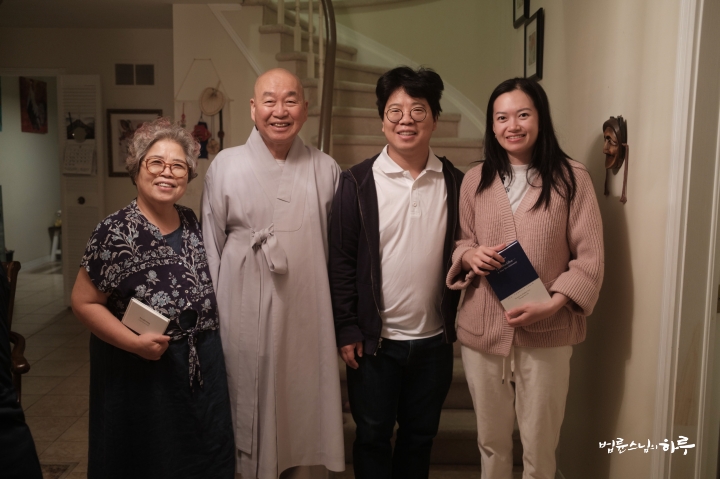
Sunim departed from the accommodation at 4 AM and headed to the airport. Since Toronto airport conducts US immigration procedures in Canada, it’s safer to arrive 3 hours early. They left early considering the Monday morning rush hour traffic. Arriving at the airport at 4:30 AM, Sunim also presented a book with thanks to Park Jin-dong, who volunteered as the driver.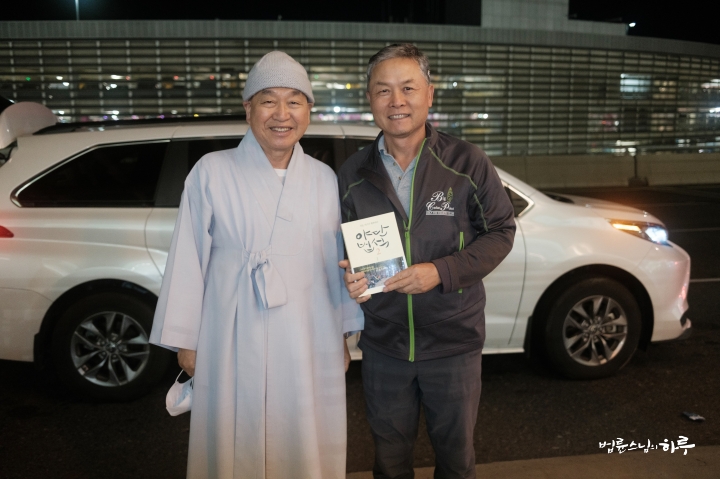
After entering the airport and completing check-in procedures immediately, Sunim waited for about an hour at the gate and had a simple breakfast with bread. Boarding the plane at 7:25 AM, Sunim arrived at Washington Ronald Reagan Airport at 9 AM.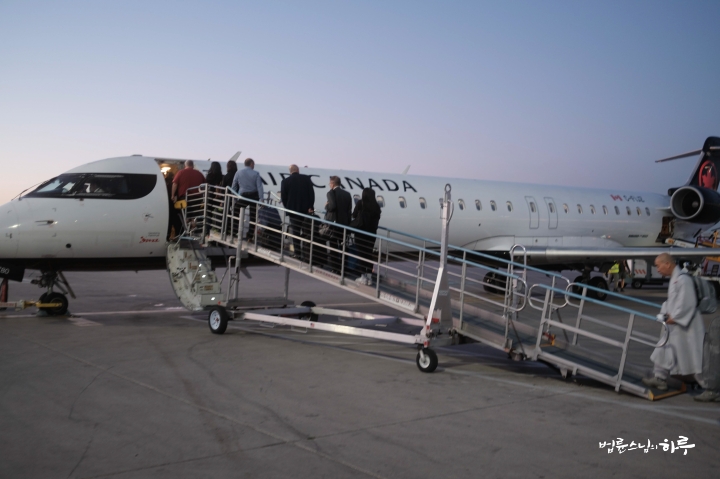
After collecting luggage, Min Deok-hong, Director of JTS USA, was waiting to greet them. After exchanging warm greetings, they moved to the Peterson Institute for International Economics (PIIE), the location of the first meeting.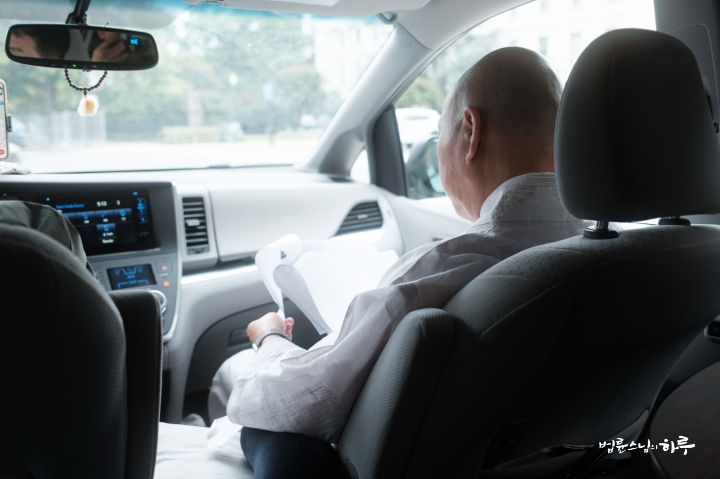
However, due to road closures near the White House causing severe traffic congestion, what normally takes 15 minutes took 1 hour and 30 minutes, arriving at Dupont Circle at 10:40 AM. This area is where think tanks such as the Brookings Institution, American Enterprise Institute, Carnegie Endowment for International Peace, and Stimson Center are gathered, making it a place Sunim frequently visits.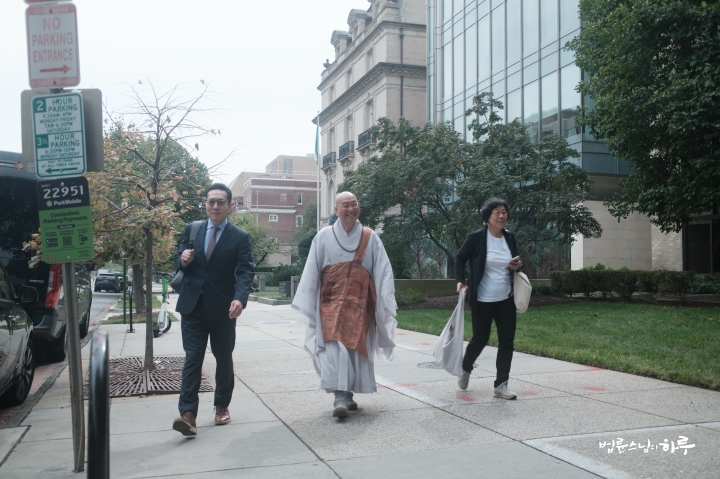
Today’s first schedule was a visit to the Peterson Institute for International Economics. Established in 1981 as a nonpartisan, nonprofit think tank, it broadly researches trade, exchange rates, global finance, and macroeconomics. It also consistently produces reports and policy recommendations regarding the Korean Peninsula, including North Korea’s humanitarian crisis, food security, and the impact of sanctions on North Korea and the international community’s response.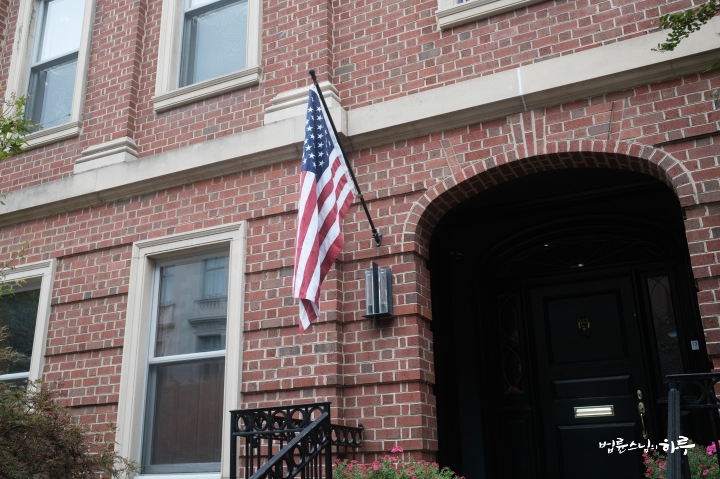
Arriving slightly earlier than scheduled, Sunim exchanged greetings with Dr. Marcus Noland, Executive Vice President of the institute.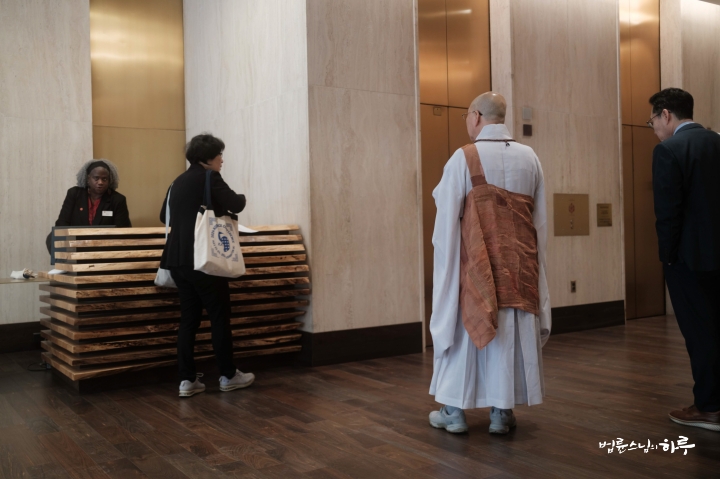
Dr. Noland has been with PIIE as Executive Vice President and Senior Fellow since 1985 and is a leading expert on the North Korean economy and East Asian political economy. It was a reunion after a long time. When Sunim asked how he had been, the doctor said he had actually been quite ill but was now fully recovered and back at work.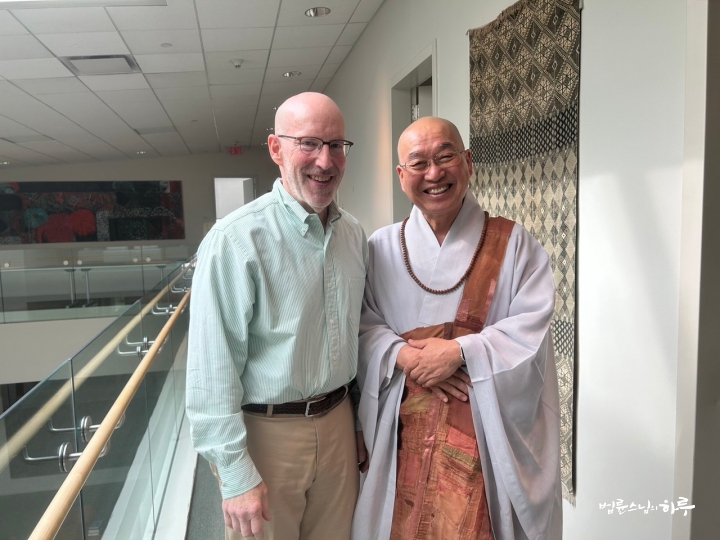
Why US-North Korea Relations Should Consider Economics, Not Just Security
Sunim began the conversation by sharing recent observations of North Korea’s rapid changes.
“Until before COVID, except for Pyongyang, it was rare to see new buildings being constructed in the provinces. However, over the past 5 years, many buildings have been erected even in provincial areas. In cities like Hyesan along the Yalu River, 7-8 buildings over 20 stories tall have been newly built. However, in contrast to this, stories from North Korean residents through unofficial channels indicate they are in very difficult situations due to food shortages. The reason for this contradiction seems to be that while the government-centered national economy appears to have some surplus, the personal economy of residents remains difficult.”
A particularly noteworthy phenomenon was the sudden exchange rate collapse that occurred this year. Sunim explained the dramatic changes in the exchange rate in detail.
“Before COVID, 1 dollar was about 8,000 won. During COVID, it rose in value to 5,000 won. After COVID ended, it fell back to 8,000 won. But recently, it has plummeted to the 40,000 won range. This is a phenomenon that is very difficult to explain through economic logic alone, so it doesn’t seem to reflect only the economic situation.”
In response, Dr. Noland presented an interesting analysis using the concept of ‘Dutch Disease.’ The Dutch Disease phenomenon refers to a situation where suddenly receiving a large windfall causes household finances to expand and people to seek only expensive things, while previously frugally operated livelihood businesses (manufacturing) gradually lose strength. In North Korea’s case, normally the value of the North Korean won should increase due to remittances from overseas workers, compensation for participation in the Russian war, and foreign currency inflows suspected from some cybercrime, but the opposite phenomenon occurred. The doctor analyzed that this was because the government received foreign currency and printed large amounts of won, using it for civil servant wage increases, construction, and military modernization, causing a surge in won supply. He emphasized that economic problems are no longer just about resources but about where to invest them and the issue of wealth disparity.
During the conversation, discussion also continued about North Korea’s main sources of income. Sunim shared content from conversations with Chinese entrepreneurs.
“According to Chinese entrepreneurs, there are no longer cases where the North Korean government fails to pay for requested materials as before, and payments are made very smoothly. Initially, I speculated that the wages of about 100,000 North Korean workers in China might be the main source of income. However, recently it has been partially confirmed that payments are coming directly from within North Korea. I think this might be compensation for military support to Russia.”
Sunim also explained the dual structure of North Korea’s economy. The consumption patterns of the wealthy have changed noticeably.
“Private ownership of cars is now possible, and luxury shops have opened. On the other hand, the lives of ordinary residents remain difficult. The markets used by residents are severely contracted. Imported materials are not being supplied to markets used by residents, and residents have no purchasing power due to lack of income.”
The conversation naturally led to future plans for improving US-North Korea relations. Sunim emphasized the need for a shift in America’s perspective while discussing future prospects.
“There is a high possibility that US-North Korea dialogue will resume in the future, and if the North Korean government’s finances gain some surplus, the conditions for dialogue may become more demanding. Even without dialogue, North Korea’s geopolitical importance has increased compared to the past. We need to pay more attention not only to North Korea’s military security issues but also to North Korea’s economic problems.”
At the end of the conversation, the issue of rare earth elements was also addressed. Sunim also presented possibilities for practical economic cooperation.
“Since China uses rare earth elements to pressure the US and South Korea, we need to find alternative supply sources to counter this, and I think North Korea could be one. So I hope the US can utilize this point well.”
Concluding the conversation, Sunim proposed specific cooperation plans.
“Next year, I would like to arrange a seminar by bringing experts from various fields including security and economics from Korea to the US. Would this be possible?”
Dr. Noland responded positively, mentioning the advantage of the Peterson Institute being a private independent research institute not connected to the government, and said he would discuss it with other experts.
Although it was a short time, it was a meaningful session for understanding the complex reality of North Korea’s economy and exploring practical cooperation measures for improving future US-North Korea relations. Particularly noteworthy was expanding the focus from security issues alone to economic issues and suggesting specific areas of cooperation like rare earth elements. After finishing the meeting at 12 PM, Sunim presented his English-translated book as a token of appreciation.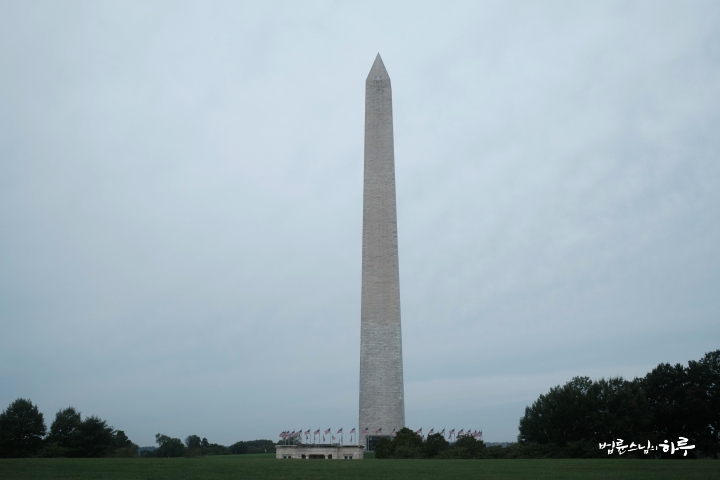
After having lunch at a nearby restaurant, sunim moved to the Mansfield Foundation for the next schedule. Arriving a bit early and going up to the office, Director Frank Jannuzi warmly welcomed them. The two are old friends, meeting again after 4 months since their last meeting at the Seoul Jungto Social and Cultural Center in June.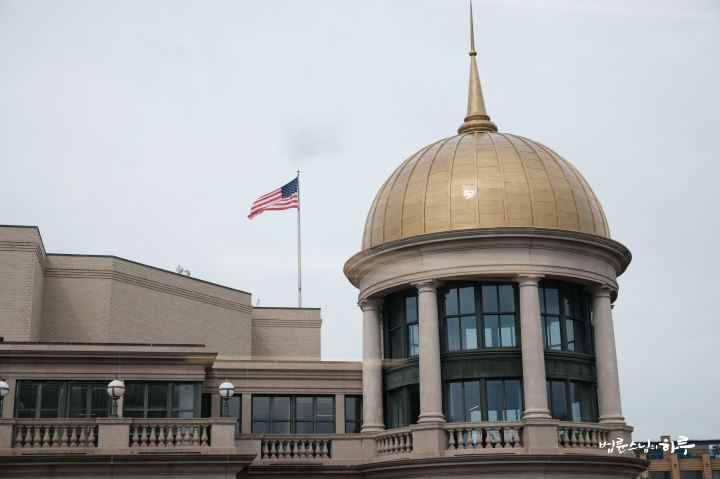
Sunim mentioned a recent article about Director Jannuzi meeting President Lee Jae-myung and expressed gratitude for the warm hospitality, while the director recalled memories of when President Lee visited the foundation 10 years ago as Mayor of Seongnam.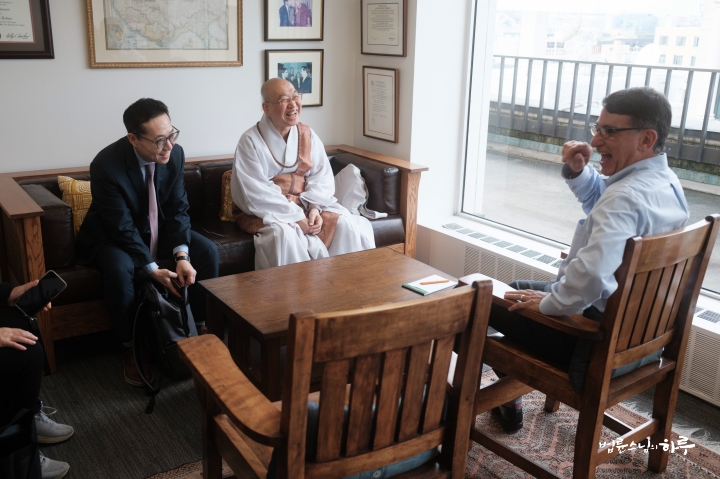
When Sunim joked, “He became president 10 years later, but what are you doing now, Mr. Jannuzi?” Director Jannuzi replied cheerfully that he was trying to let go of desires following Sunim’s teachings.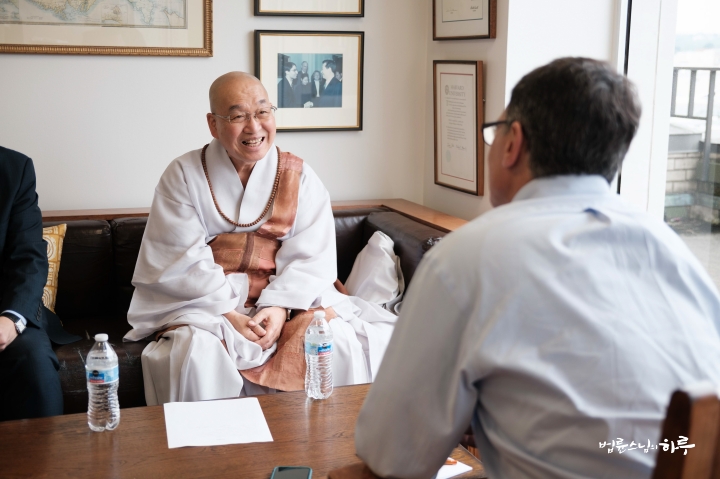
Subsequently, Keith Luse, Executive Director of NCNK, arrived and joined the conversation. The two have maintained connections with Sunim since working as Democratic and Republican foreign policy experts respectively in the US Senate in the early 2000s. After exchanging greetings, they began the roundtable.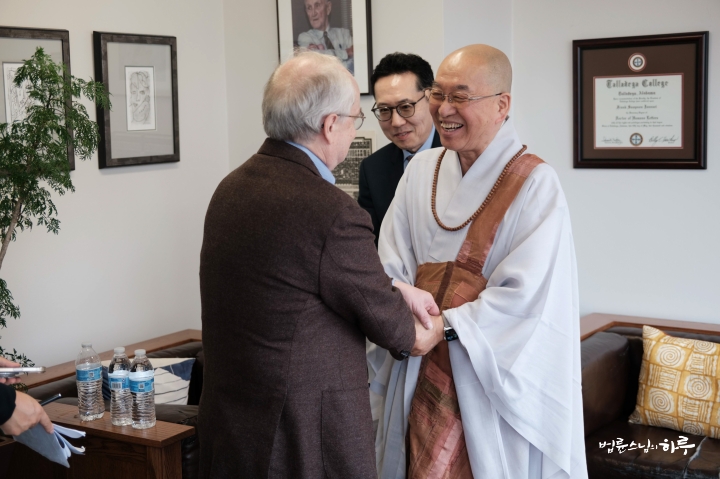
Sunim briefed eight Korean Peninsula experts on recent North Korean situations and security issues and received questions. North Korea and East Asian security experts including Bruce Klingner (former CIA/DIA), John Nilsson-Wright (Cambridge University Professor), Jenny Town (Stimson Center), and Frank Aum (former USIP) attended.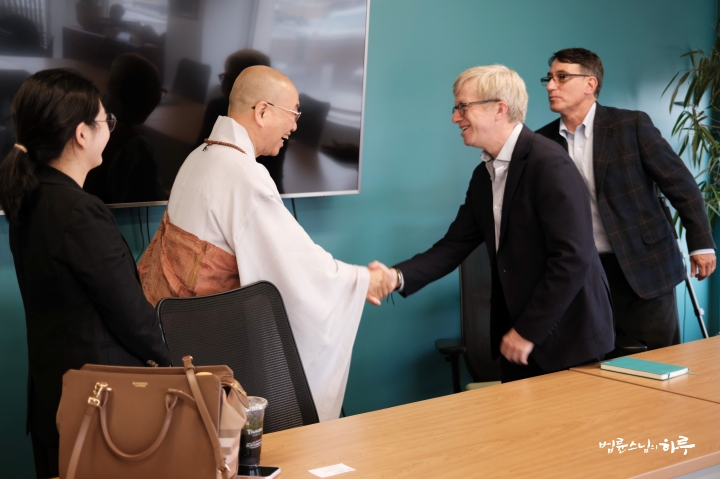
If the US Wants to Resume Dialogue with North Korea, Where Should It Start?
First, Sunim posed fundamental questions about the Trump administration’s executive orders and the American democratic system.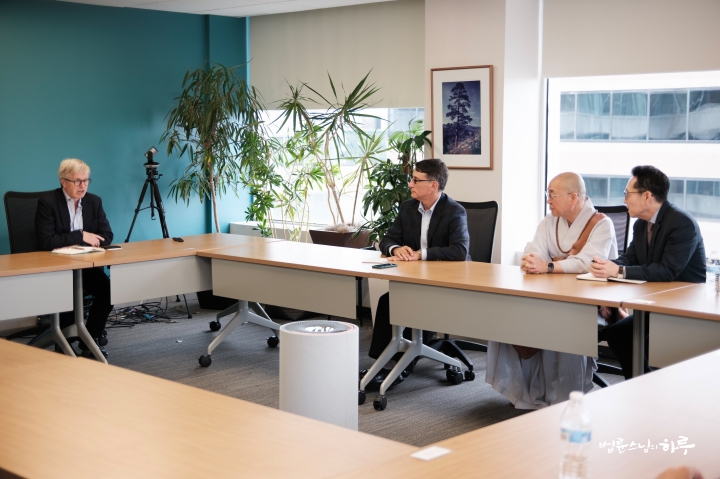
“Currently, President Trump seems to be acting beyond the law. Is this a problem with America’s system, or is it a temporary phenomenon? Citizens and the opposition party must have views that there are problems with this, but they seem to just be going along with it.”
Director Frank Jannuzi said many of President Trump’s executive orders potentially violate the Constitution, citing examples such as attempts to abolish birthright citizenship and abuse of tariff authority. He also explained that while systemic weaknesses have always existed, what’s new is the president’s special attitude, Congress abandoning its authority, and the Supreme Court’s distortion creating the current situation. Director Keith Luse added that President Trump meticulously prepared for his return over 4 years, and strong support bases in local communities are pressuring Congress. Sunim viewed this phenomenon in a larger historical context, discussing concerns about the global rise of authoritarianism, not just President Trump’s individual issues.
The conversation continued with specific measures for resuming US-North Korea dialogue. First, Sunim proposed a new approach to the prerequisites for US-North Korea dialogue.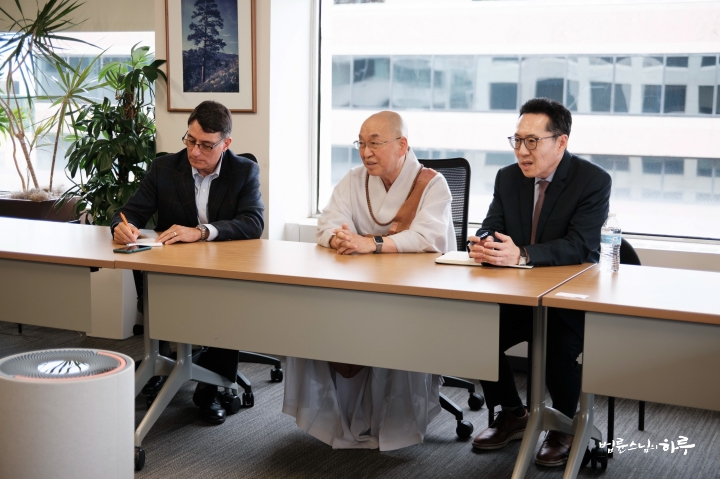
“If dialogue starts with denuclearization as a prerequisite, North Korea likely won’t respond to dialogue. Dialogue should begin within the larger framework of normalizing US-North Korea relations, and within that, address denuclearization and economic sanctions issues. If the US demands denuclearization, North Korea won’t comply, so through give-and-take, nuclear freeze could be found as a compromise point. For economic sanctions too, North Korea will demand lifting, and since the US can’t comply with that, they could compromise on temporary suspension of economic sanctions.”
Sunim explained what North Korea wants most.
“North Korea certainly needs economic sanctions lifted, but it seems to want military pressure lifted even more. To borrow an expression from a North Korean government official, they say it doesn’t make sense to ask for dialogue while holding a knife to their throat and strangling them. Holding a knife to the throat refers to offensive training mobilizing strategic assets, and the expression of strangling refers to economic sanctions. In other words, they seem to want to resolve the knife at the throat faster than the strangling.” 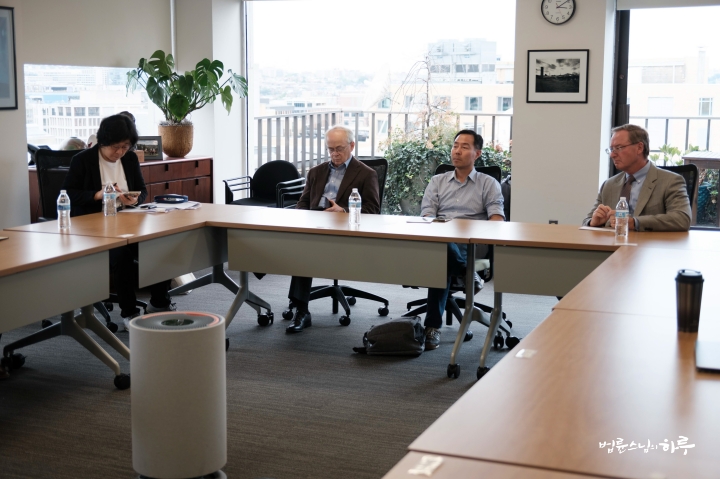
“North Korea thinks the US broke off the Hanoi summit, so to resume dialogue, they think the US needs to make some new proposal. Therefore, the US proposal for unconditional dialogue is no longer an attractive proposal to North Korea. In my opinion, an approach like President Trump saying ‘I heard North Korea developed Wonsan well, can I go see it?’ would be much more effective. Especially, dialogue should start from the perspective of normalizing relations, not denuclearization. Summit meetings should start dialogue in a top-down manner, and specific content should be prepared by working-level officials from bottom-up. Since both sides have been experienced, balance must now be achieved.” 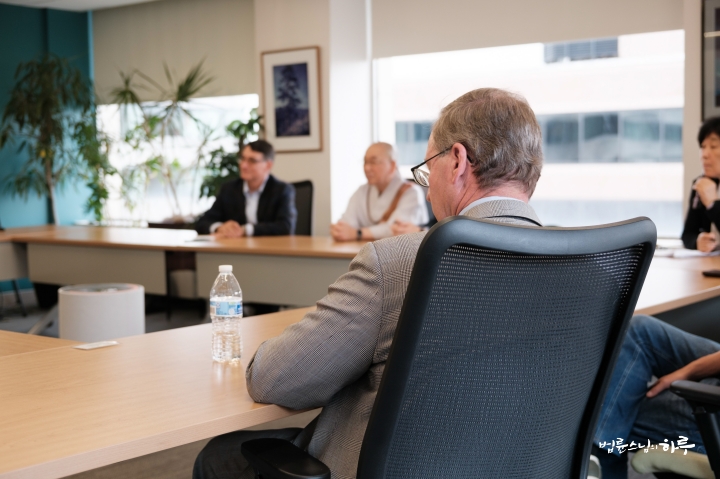
Sunim also explained that he had advised Japan on improving relations with North Korea.
“It’s necessary to clarify what’s more important: resolving the abductee issue or using it as leverage to pressure North Korea. If the goal is truly to resolve the abductee issue, it can only be solved through dialogue. Making the abductee issue a precondition makes dialogue itself impossible.
North Korea has the goal of building a prosperous and powerful nation. While North Korea has become a powerful nation, it’s not yet a prosperous one, is it? To become prosperous, an alliance with Russia alone won’t suffice. They need to improve relations with the United States. However, the U.S. lacks the funds to provide support. They’re currently demanding tariffs from countries worldwide. Therefore, the money must come from elsewhere. It could come from China or South Korea, but Chinese money carries the risk of dependency, and South Korean money risks alienating public sentiment. From my perspective, the safest money for North Korea is Japanese money. That’s why they need to improve relations with Japan.”
Sunim presented clear priorities for peace on the Korean Peninsula and proposed a new approach.
Peace Roadmap for the Korean Peninsula After the Hanoi Summit Breakdown
“My concern is peace on the Korean Peninsula. To achieve peace, first, relations between North Korea and the United States need to improve; second, relations between North Korea and Japan need to improve; and third, inter-Korean relations need to improve. In the past, South Korea tried to improve inter-Korean relations first to solve the remaining issues. Given North Korea’s current position, it has become difficult to resolve inter-Korean relations first. Therefore, a new approach is needed. The South Korean government should not take the stance that it’s being bypassed, but rather help facilitate the resolution of North Korea-U.S. and North Korea-Japan relations first. This is because preventing war on the Korean Peninsula is our top priority. 
Should we allow North Korea to continue producing and proliferating nuclear weapons? We need to find ways to reduce the risk. Of course, nuclear weapons are dangerous. However, focusing too much on nuclear weapons alone prevents us from seeing the overall security situation in East Asia. Particularly, if war breaks out on the Korean Peninsula, the damage would be immeasurable. The competition between South and North Korea to strengthen their defense capabilities only leads to an endless arms race. Of course, defense against attacks must be prepared. However, the real path to peace is ensuring through dialogue that the other side has no intention of waging war. To improve relations with North Korea, we need to understand the conditions North Korea faces and respond accordingly for more effective results.” 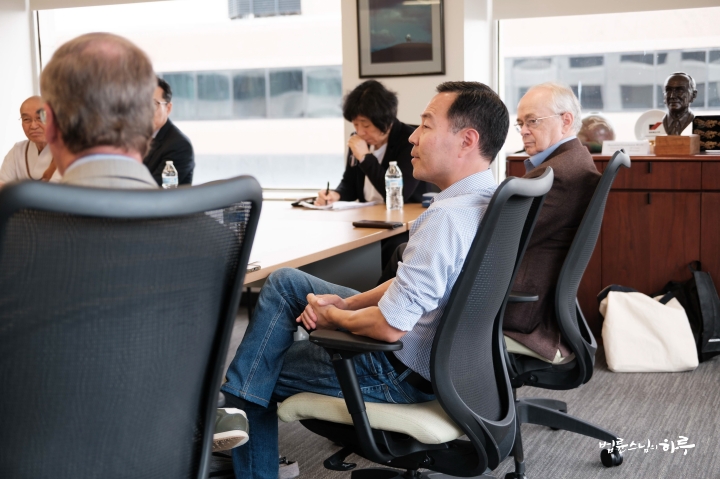
This roundtable was a meaningful forum that discussed not only North Korea issues but also the crisis of democracy, historical turning points, and practical approaches toward peace. Participants showed deep interest in Sunim’s field experience, insights, and balanced perspective, and positively discussed the potential for future collaboration between Korean experts and American think tanks.
The lively Q&A session extended beyond the scheduled time, and Sunim thanked the participants while presenting them with English translations of his books as gifts.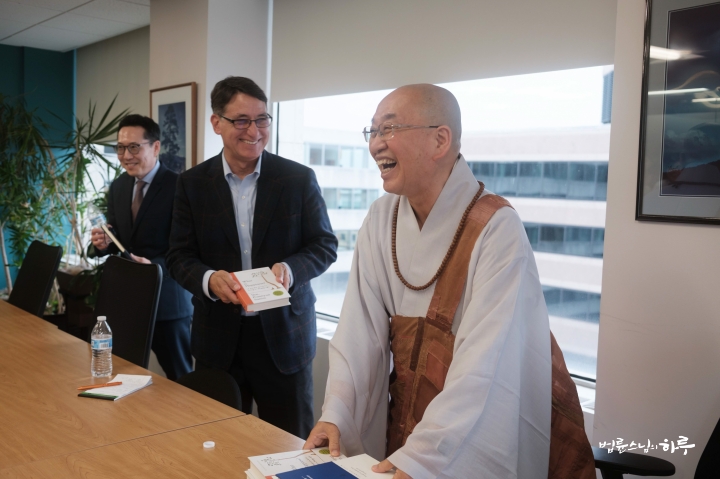
After briefly discussing plans for the next Washington D.C. visit with Director Zannucci and Executive Director Keith Luse, the meeting concluded.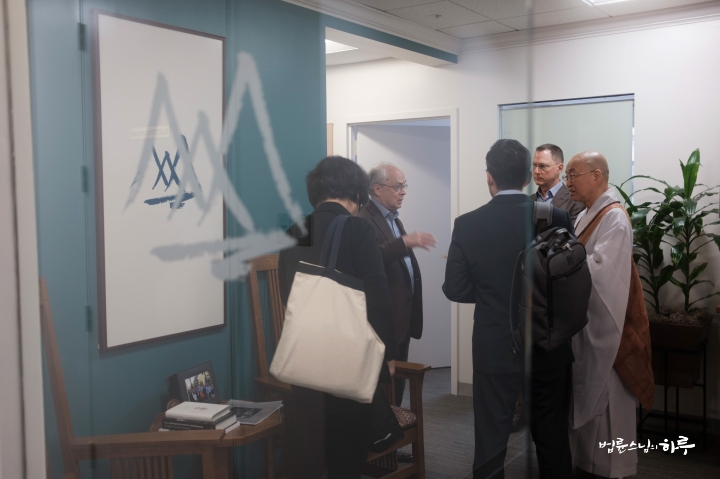
Sunim then moved to another meeting location to meet with Hannah Kim.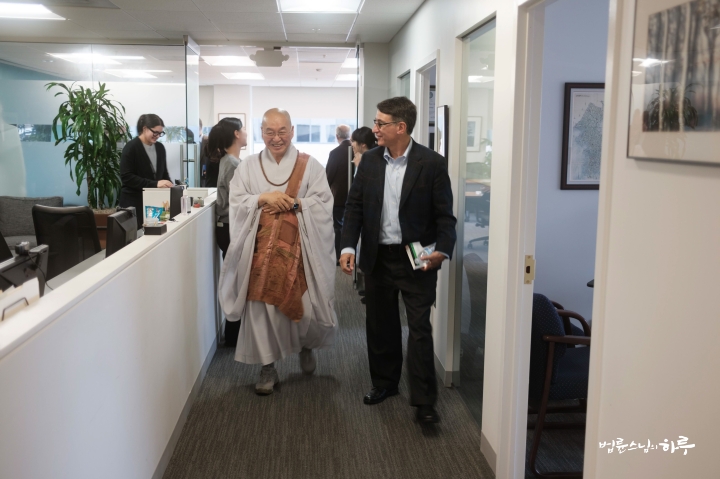
Hannah Kim founded the nonprofit organization “Remember 727” in 2008 to honor Korean War veterans. In 2009, she played a leading role with Congressman Charles Rangel in establishing July 27th as the annual “Korean War Veterans Armistice Day.” She subsequently toured 26 participating nations worldwide and all 50 U.S. states, leading fundraising efforts for memorial walls to express gratitude to veterans. From 2010 to 2016, she served as Chief of Staff and Communications Director for Congressman Rangel’s office, and in 2021, she served as Deputy Assistant Secretary at the Department of Health and Human Services and as a White House policy advisor in the Biden administration. Today, she attended the meeting with her husband Levi to exchange views on various topics including the U.S. political situation.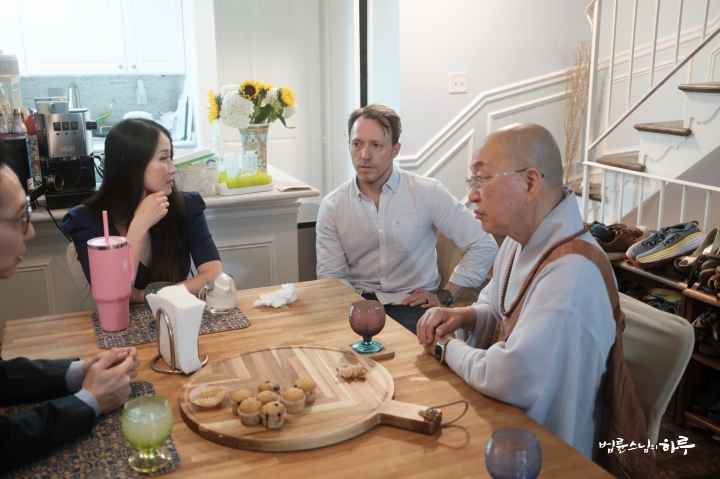
In the evening, Sunim attended a Chuseok commemoration event near the U.S. Congress, invited to a fundraising night for Andy Kim, the first Korean American elected to the federal Senate.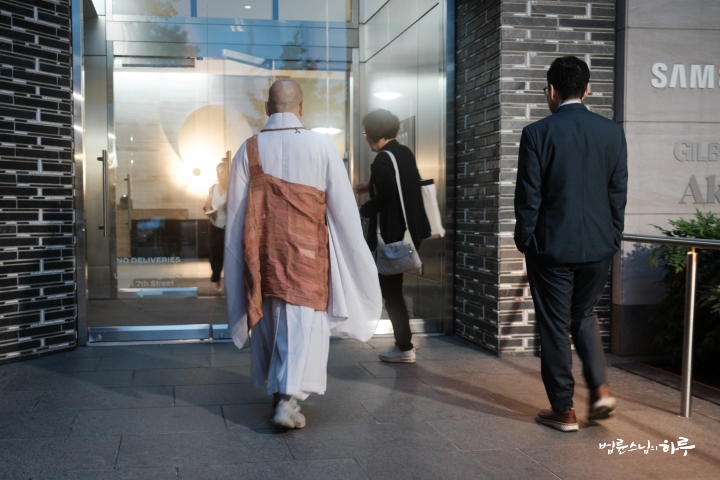
Sunim exchanged greetings with Senator Andy Kim and discussed various current issues. He particularly urged the senator to help open pathways for displaced persons whose homeland is North Korea to visit on humanitarian grounds, and to join efforts for humanitarian aid and peace on the Korean Peninsula.
After the event, Sunim left the venue at 8:30 PM and headed to the Washington DC Jungto Center. With no traffic congestion, he arrived in just 30 minutes. After discussing tomorrow’s schedule, he concluded the day at 10 PM. It had been a long day.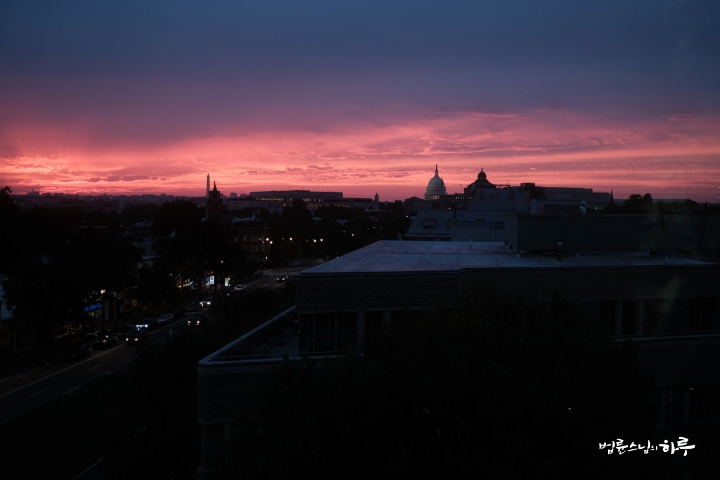
Tomorrow morning, Sunim will visit the Brookings Institution to discuss improving North Korea-U.S. relations and peace on the Korean Peninsula. In the afternoon, he will have personal consultations, and in the evening, he will continue with the fourth lecture of the North American tour in Virginia.




